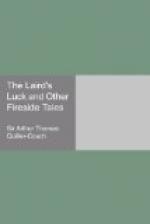“Strong as a horse,” he assented cheerfully. “I call it wonnerful after what she’ve a-gone through. ‘Twouldn’ surprise me, one o’ these days, to hear she’d taken up a tub with the cheeld in it, and heaved cheeld and all over the quay-door. She’s terrible absent in her mind.”
Mrs. Mayow came panting back with a kettleful of water, which she set to boil; and, Cherry now reappearing with the report that all the children were safe abed, the three women sat around the fire awaiting their supper, and listening to the voice of the Cheap Jack without.
“We’ll step out and have a look at him by-and-by,” said Cherry.
“For my part,” Mrs. Mayow murmured, with her eyes on the fire, “I never hear one of those fellers without wishing I had a million of money. There’s so many little shiny pots and pans you could go on buying for ever and ever, just like Heaven!”
She sighed as she poured the boiling water into the teapot. On Saturday nights, when the children were packed off, a deep peace always fell upon Mrs. Mayow, and she sighed until bed-time, building castles in the air.
Their supper finished, the two girls left her to her musings and stepped out to see the fun. The naphtha-lamps flared in Hester’s face, and for a minute red wheels danced before her eyes, the din of a gong battered on her ears, and vision and hearing were indistinguishably blurred. A plank, like a diving-board, had been run out on trestles in front of the caravan, and along this the assistant darted forwards and backwards on a level with the shoulders of the good-humoured crowd, his arms full of clocks, saucepans, china ornaments, mirrors, feather brushes, teapots, sham jewellery. Sometimes he made pretence to slip, recovered himself with a grin on the very point of scattering his precious armfuls; and always when he did this the crowd laughed uproariously. And all the while the Cheap Jack shouted or beat his gong. Hester thought at first there were half-a-dozen Cheap Jacks at least—he made such a noise, and the mirrors around his glittering platform flashed forth so many reflections of him. Trade was always brisk on Saturday night, and he might have kept the auction going until eleven had he been minded. But he had come to stay for a fortnight (much to the disgust of credit-giving tradesmen), and cultivated eccentricity as a part of his charm. In the thickest of the bidding he suddenly closed his sale.
“I’ve a weak chest,” he roared. “Even to make your fortunes—which is my constant joy and endeavour, as you know—I mustn’t expose it too much to the night air. Now I’ve a pianner here, but it’s not for sale. And I’ve an assistant here—a bit worn, but he’s not for sale neither. I got him for nothing, to start with—from the work’us” (comic protest here from the assistant, and roars of laughter from the crowd)—“and I taught him a lot o’ things, and among ’em to play the pianner. So as ‘tis Midsummer’s Eve, and I see some very nice-lookin’ young women a tip-tapping their feet for it, and Mr. Mayow no further away than next door, and able to play the fiddle to the life—what I say is, ladies and gentlemen, let’s light up a fire and see if, with all their reading and writing, the young folks have forgot how to dance!”




